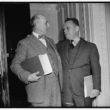Brad Paisley went on Ellen this week to explain his new country song, “Accidental Racist.” Ellen Degeneres asked: “So you’re basically saying?” Paisley answered: “I don’t know.”
Pop music is disposable by design. Pop music is also a space for society to work through its collective feelings, anxieties, sentimentality, hopes, and dreams. As such, LL Cool J and Brad Paisley’s recent song “Accidental Racist” is a product of a confused post-racial America where the “national discourse” on race is moribund, twisted, tired, and empty.
In the post-Civil Rights Era, white folks apparently just want “forgiveness” and to “get past” this race stuff. Black and brown folks want some type of justice and an acknowledgement of how structural inequality along the color line persists into the present.
The former want to limit racism to “mean words” and “hurt feelings.” The latter would like to discuss substantive efforts at improving live chances and the social inequalities caused by racism, both structural and inter-personal.
For both groups the twice-election of Barack Obama has meaning. Both groups are also unsure about what this means in either the short or long term.
“I would not expect LL Cool J or Brad Paisley to fully understand the political work done by their song ‘Accidental Racism.'”
Because America is “a country without a history”–perhaps except for black and brown folks–there is no reasonable way to negotiate this impasse.
This dynamic is made even more complicated by how white privilege allows white folks to conveniently discover their own history on terms that are amenable to them.
This move is often used to blunt conversations about how racial inequality is trans-historical with a living past and present, one that shapes American society even in the post-Civil Rights Era.
- “My ancestors came from Europe and never owned slaves”
- “Slavery was so long ago, why are you still talking about this stuff?”
- “We were immigrants who came here with nothing and didn’t complain or ask for handouts”
- “My father was white and he marched with Dr. King, we were ‘good’ white people, don’t get mad at me.”
These are appeals to history to avoid a conversation about culpability and systems of privilege in the present.
These claims on history–as we saw with Mitt Romney–are often exposed to be lies. There are likely more than a few good white folks who claimed that there families never owned slaves, only to do a little bit of research, and then find out that their ancestors were human chattel merchants. History can be very inconvenient.
LL Cool J and Brad Paisley’s song is a narrative of false equivalence in which the Confederacy’s (a white supremacist terrorist state’s) crimes against humanity can be compared to the still-incomplete work of racial justice that began with the black and brown freedom struggles centuries ago, but was prematurely pronounced done and complete with Dr. Martin Luther King’s much misunderstood “I Have a Dream Speech.”
LL Cool J and Brad Paisley are in good company. They are trafficking in “low culture” as they conspire to flatten the history and present of America as a society structured in racial inequalities, but where “race and reunion” can come through a country-rap song.
Then-candidate Barack Obama, who was an elite opinion leader, played a similar game in his much vaunted Philadelphia speech on race during the 2008 campaign. Obama, in an effort to win the White House by distancing himself from the “political blackness” embodied by the Rev. Wright, suggested that African Americans’ justice claims are somehow morally and ethically equivalent to the racial resentment felt by many white Americans towards people of color in their backlash against the gains of the Civil Rights Movement.
I would not expect LL Cool J or Brad Paisley to fully understand the political work done by their song “Accidental Racism.”
Barack Obama, the country’s first black President, and a constitutional scholar, ought to know better. But then again, Obama’s move in 2008 (and since) was both tactically shrewd and intentional: blackness is a liability in almost every area of American public, social, and political life. Consequently, it is a social marker to be avoided at all costs.
“The Accidental Racist” demonstrates that the key to writing a pop song about race in the age of Obama is to avoid any serious consideration of the challenging particulars of American racial history, make “everyone” feel good, and create a fiction where black and brown people’s experiences with racial oppression in the United States are made the same as the “misunderstood” white guy whose feelings have been “hurt” because of his love of “Southern pride” and the Confederate States of America.
Public opinion research suggests that white people are feeling “oppressed” in the post-Civil Rights Era and the symbolic change brought about be the election of the country’s first black president. Social science data also demonstrates how many white people feel that “anti-white” racism is a bigger social ill than discrimination against people of color.
“The Accidental Racist” is a perfect soundtrack for a political moment. LL Cool J and Brad Paisley’s song may be a creative failure but it succeeds wonderfully in capturing the spirit of the age.
Chauncey DeVega is an essayist, cultural critic, and host of “The Chauncey DeVega Show” podcast.



0 Comments